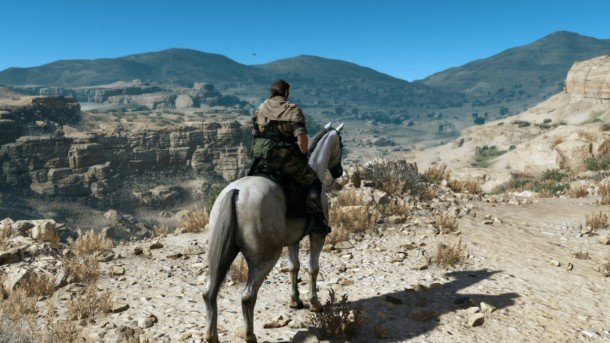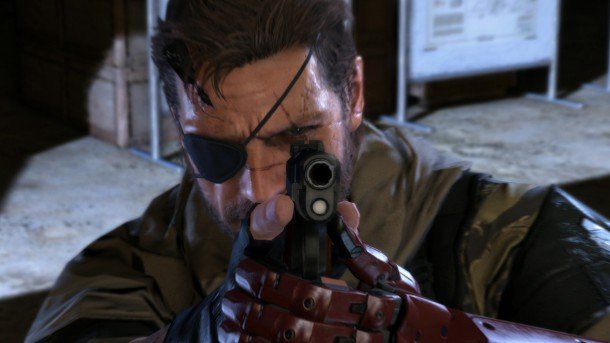Why Metal Gear Solid 5 belongs on PC

Update: This editorial was written before Metal Gear Solid V was announced for PC. Konami has since confirmed that MGSV is coming to Steam along with the PS4 and XB1 .
I love Hideo Kojima. He understands games, and the way people play them, more than any other developer. He's often accused of being a frustrated filmmaker using the medium to live out his directing fantasies, but only by people who haven't played his games. His long, indulgent cutscenes are notorious, yes, but they're only a small part of the whole, wonderful Kojima experience. He's a game designer first and foremost, and his unique brand of magic and madness belongs on PC.
The Metal Gear Solid series has been woefully under-served on PC. We got lacklustre ports of the first two games, but so far they're the only ones to escape console land. Rising, a spin-off that has very little in common with the main series, doesn't count. The latest game is Metal Gear Solid 5: The Phantom Pain, and although no Windows version has been announced—for now it's a PlayStation and Xbox exclusive—it's being built with Kojima Productions' in-house Fox engine . The studio recently revealed that this new tech is designed with cross-platform in development in mind, which gives me hope that this new game will one day sneak onto PC.
But why should it? Because, despite its console roots, Metal Gear Solid has always felt like a PC game to me. Its stealth is rich and systems-driven, giving you the freedom, and the tools, to be genuinely creative—traits that define games like Deus Ex, Thief, and System Shock. There are countless ways to combine items, exploit the AI, and use the environment to your advantage, and the levels are large and open, offering multiple ways to complete your objectives. The third game, Snake Eater, is the best example of the series' rich, reactive stealth—just watch this video of an experienced player hilariously toying with a group of guards.
Reactivity is an important part of Kojima's design philosophy. When I say he understands how people play games, I mean he's always second guessing you. Almost everything you do in a Metal Gear game has a funny, interesting, or bizarre reaction. I can't think of any other games that acknowledge and reward experimentation as much as Metal Gear does, and it's incredibly satisfying as a player to have your attempts to break or manipulate the systems noticed. It's always deflating when a game doesn't respond to your actions in a meaningful way—like when you save the world in Skyrim and no one seems to give a shit—but this is never a problem where Kojima is involved.
His games are also filled with what I call Kojima moments . Some are well known, like the psychic boss in the first game who accesses your PlayStation memory card and comments on games you've been playing, but there are many, many more. In MGS3 there's a boss called The End, a hundred year-old sniper who can take over an hour to defeat normally—unless you set your system clock forward by a week, in which case he'll die of old age. In MGS2, knocking over an ice bucket causes the cubes to spill out, and if you zoom in with your binoculars you can see them melt in real-time. And in MGS4, shooting people with 'emotion bullets' causes them to break down in tears or burst out laughing. Individually these might seem like frivolous details, but in concert with the many other examples that litter every level, it makes for a compellingly detailed, interactive world.
In most situations—whether you're being peed on by a guard or shooting seagulls—calling up a character on your codec/radio will reward you with relevant amusing dialogue. Call weapons expert Nastasha in MGS1 with a cardboard box equipped and she'll lecture you on the history of cardboard boxes. Mei Ling, who saves your game, will stick her tongue out and refuse to talk to you if you repeatedly call her and don't save. The sheer amount of detail in Kojima's work is dizzying; another reason why I think he's one of the best designers in the business. You can really feel the love and passion that goes into every Metal Gear game.
Keep up to date with the most important stories and the best deals, as picked by the PC Gamer team.

Another important part of what makes the series so special is its love of demolishing the fourth wall. I won't spoil the story for anyone who's yet to play it, but Metal Gear Solid 2 in particular frequently suggests that the characters are in a video game, and even talks directly to the player—which is actually a huge part of the story and the overall themes of the game. Here's an interesting (and spoiler-filled) critical analysis . He rarely gets credit for it, but Kojima used the fourth wall, subversion, and humour to question the nature of player agency years before The Stanley Parable and BioShock.
But back to Metal Gear Solid 5. What excites me about this sequel is that Kojima is bringing his trademark stealth to an open world setting. The game is set across a large map with a day/night cycle, dynamic weather, and vehicles. But staying true to his love of systems, these aren't just for show: guard patrol routes and frequency will be different at night, freak sand storms provide helpful cover, and you can hide in enemy vehicles as they move around the map. You were always able to choose how you approach objectives in Metal Gear, but never to this scale. Fox is an impressive engine, and PC would be the perfect place to show it off. There's even a management sim in there, which lets you design and manage a base, recruiting soldiers—and sheep —from the field.
The problem is, if you've never played a Metal Gear game before, The Phantom Pain's story won't make a lick of sense. Hell, I'm pretty well-versed in MGS lore and I don't understand half the stuff in the trailers. Konami recently released an 'HD collection' for consoles, including upscaled versions of MGS2 and MGS3, and they really should think about bringing it to Steam. Kojima needs to have a presence on PC. He's one of the biggest personalities and boldest innovators in the industry, and although his execution can be clumsy, he genuinely wants to make you think when you play his games—about politics, history, love, and giant nuclear robots. “I don't want people to play my games just for fun,” he said in a documentary about the making of MGS4. “I want players to find something more, to enrich their lives through games. Something more than just playing. Your outlook on life might change as a result of playing Metal Gear Solid. You'll learn many things, and you may share your feelings and become closer to your friends and family.”
If it’s set in space, Andy will probably write about it. He loves sci-fi, adventure games, taking screenshots, Twin Peaks, weird sims, Alien: Isolation, and anything with a good story.


